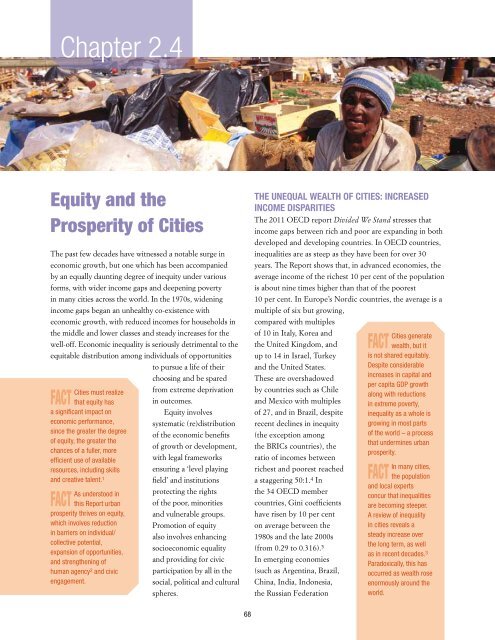Quality <strong>of</strong> Life and Urban Prosperityfrom 3.4 km to over 25 km and across four municipaljurisdictions. At national level, <strong>the</strong> Mexican governmenthas launched an ambitious programme to recover publicspaces in a bid to improve quality <strong>of</strong> life and enhance publicsecurity, particularly in marginalized neighbourhoods invarious <strong>cities</strong>. 30 In Cuba, as part <strong>of</strong> a ‘non-discriminatoryenjoyment <strong>of</strong> public spaces’ policy, several culturalprogrammes have been made free or affordable for all, withplazas, avenues and even vacant lots featuring various eventsthat enhance quality <strong>of</strong> life. 31In Europe, public greens which take <strong>the</strong> form <strong>of</strong> cornerlots, small community parks, street greens, linear parks,and river banks as wellas large city parks, aredesigned for specific types<strong>of</strong> activity. The livelinessand continuous use <strong>of</strong>public space as a publicgood leads, in turn, tourban environments thatare well-maintained andsafe, making <strong>the</strong> city anattractive place to live andwork in. 36policy “Havingaccess topublic spaces does notonly improve quality<strong>of</strong> life, it is a first stepto civic empowermenton <strong>the</strong> way to fur<strong>the</strong>rinstitutional and politicalspaces”. 37Endnotes1 Stiglitz, J.E., A. Sen, and J-P. Fitoussi (2009) Report by <strong>the</strong> Commission on <strong>the</strong>Measurement <strong>of</strong> Economic Performance and Social Progress, The Commission, Paris,http://www.stiglitz-sen-fitoussi.fr/en/index.htm2 Stiglitz, J.E., A. Sen, and J-P. Fitoussi (2009) op. cit.3 Andrulis ,D.P., H.M. Reid, L. M. Duchon (2004), Quality <strong>of</strong> Life in <strong>the</strong> Nation’s 100Largest Cities and Their Suburbs: New and Continuing Challenges for ImprovingHealth and Well-Being, The Social and Health Landscape <strong>of</strong> Urban and SuburbanAmerica Report Series, USA.4 Stiglitz, J.E., A. Sen, and J-P. Fitoussi (2009) op. cit.5 www.worldvaluessurvey.org6 European Environment Agency (2009), Ensuring quality <strong>of</strong> life in Europe’s <strong>cities</strong> andtowns: Tackling <strong>the</strong> environmental challenges driven by European and global change,EEA Report 5/2009,Office for Official Publications <strong>of</strong> <strong>the</strong> European Communities,Luxembourg7 http://www.mercer.com/articles/quality-<strong>of</strong>-living-survey-report-2011; Also targetingbusiness, <strong>the</strong> Economist Intelligence Unit designed a Quality <strong>of</strong> Life Index usingnine factors: material well-being, health, political stability and security, family life,community life, gender equality, political freedom, climate and geography, and jobsecurity, Refer to http://www.economist.com/media/pdf/QUALITY_OF_LIFE.pdf8 European Environment Agency (2009) op. cit.9 Bodin-Buyle Z., and C. Hermant-De Callataÿ (2011), Urban Prosperity and Quality <strong>of</strong>Life in European <strong>cities</strong> – Beyond GDP, European Union, Brussels, prepared for UN-Habitat as part <strong>of</strong> EU – UN-Habitat collaboration.10 European Environment Agency (2009) op. cit.11 Dzung, D. D. (2011) City Report on Ho Chi Minh City, Unpublished UN-Habitatbackground study for “State <strong>of</strong> <strong>the</strong> World’s Cities Report <strong>2012</strong>/<strong>2013</strong>”12 Fernandez, F.L. (2011) City Report on Cebu, Unpublished UN-Habitat backgroundstudy for “State <strong>of</strong> <strong>the</strong> World’s Cities Report <strong>2012</strong>/<strong>2013</strong>”13 Lupala, A. (2011) City Report on Dar es Salaam, Unpublished UN-Habitat backgroundstudy for “State <strong>of</strong> <strong>the</strong> World’s Cities Report <strong>2012</strong>/<strong>2013</strong>”14 European Environment Agency (2009) op. cit.15 Al-Bassam, D. and J. Mouris (2011) City Report on Dubai, Unpublished UN-Habitatbackground study for “State <strong>of</strong> <strong>the</strong> World’s Cities Report <strong>2012</strong>/<strong>2013</strong>”16 Mena, A. (2011) City Report on Doha, Unpublished UN-Habitat background study for“State <strong>of</strong> <strong>the</strong> World’s Cities Report <strong>2012</strong>/<strong>2013</strong>”17 Centre for Livable Cities (2011) City Report on Singapore, Unpublished UN-Habitatbackground study for “State <strong>of</strong> <strong>the</strong> World’s Cities Report <strong>2012</strong>/<strong>2013</strong>”18 Fawaz, M. and N. Baghdadi (2011) City Report on Beirut, Unpublished UN-Habitatbackground study for “State <strong>of</strong> <strong>the</strong> World’s Cities Report <strong>2012</strong>/<strong>2013</strong>”19 Omenya, A. (2011) City Report on Nairobi, Unpublished UN-Habitat background studyfor “State <strong>of</strong> <strong>the</strong> World’s Cities Report <strong>2012</strong>/<strong>2013</strong>”20 Lima Como Vamos (2010) Lima Según sus Ciudadanos, Observatorio Ciudadano,Informe de Percepción sobre la Calidad de Vida, Lima.21 Veolia Environment (2010), Villes à Vivre 2010, Observatoire Veolia de Modes de VieUrbains, Paris.22 Davis, D. (2007) “Urban Violence, Quality <strong>of</strong> Life, and <strong>the</strong> Future <strong>of</strong> Latin AmericanCities,” in Allison M. Garland,A.M, M. Massoumi and B. A. Ruble (Eds) Global UrbanPoverty: Setting <strong>the</strong> Agenda. Woodrow Wilson International Center for Scholars,Comparative Urban Studies Project, Washington D.C, pp. 57-87.23 UN-Habitat (2007) Enhancing urban safety and security: Global report on humansettlements 2007, Earthscan, London24 Mendoza, I. R. (2011) City Report on Panama City, Unpublished UN-Habitatbackground study for “State <strong>of</strong> <strong>the</strong> World’s Cities Report <strong>2012</strong>/<strong>2013</strong>”25 Fernandez, F.L. (2011) op. cit.26 Al- Kubaisy, F. (2011) City Report on Al-Muharrak, Unpublished UN-Habitatbackground study for “State <strong>of</strong> <strong>the</strong> World’s Cities Report <strong>2012</strong>/<strong>2013</strong>”27 UN-Habitat (2010), Bridging <strong>the</strong> Urban Divide, State <strong>of</strong> <strong>the</strong> World’s Cities Report2010/2011, Earthscan, London28 Shabou, A., N. Soboh, K. Jalouka, and D. A. Thaib (2011) City Report on Amman,Unpublished UN-Habitat background study for “State <strong>of</strong> <strong>the</strong> World’s Cities Report<strong>2012</strong>/<strong>2013</strong>”29 Fernandez, C. (2011) City Report on Cape Verde, Unpublished UN-Habitat backgroundstudy for “State <strong>of</strong> <strong>the</strong> World’s Cities Report <strong>2012</strong>/<strong>2013</strong>”30 SEDESOL (2007). Guia de Diseno del Espacio Publico Seguro, Incluente ySustentable. Secretaria de Desarrollo Social, México31 Coyula, M. (2011) City Report on Havana, Unpublished UN-Habitat background studyfor “State <strong>of</strong> <strong>the</strong> World’s Cities Report <strong>2012</strong>/<strong>2013</strong>”32 The agreed international ratio is 8 square meters per capita. For instance, Lima, <strong>the</strong>capital <strong>of</strong> Peru, has around 3 square meters, <strong>the</strong> Mexican border city <strong>of</strong> Tijuana hasaround one or two, and Al-Muharrak in Bahrain has less than 1 square meters.33 Jin, L. and Y. Liu (2011) City Report on Shenzhen, Unpublished UN-Habitatbackground study for “State <strong>of</strong> <strong>the</strong> World’s Cities Report <strong>2012</strong>/<strong>2013</strong>”34 Liu, Y. and Y. Wang (2011) City Report on Chongqing, Unpublished UN-Habitatbackground study for “State <strong>of</strong> <strong>the</strong> World’s Cities Report <strong>2012</strong>/<strong>2013</strong>”35 Centre for Livable Cities (2011) op. cit.36 Shehayeb, D. (2008) ‘Safety and Security in Public Space’ in International Report onCrime Prevention and Community Safety: Trends and Perspectives, ICPC, Montreal,pp. 107-11237 Castellanos, G. (2011) City Report on Santo Domingo, Unpublished UN-Habitatbackground study for “State <strong>of</strong> <strong>the</strong> World’s Cities Report <strong>2012</strong>/<strong>2013</strong>”67
Chapter 2.4Equity and <strong>the</strong>Prosperity <strong>of</strong> CitiesThe past few decades have witnessed a notable surge ineconomic growth, but one which has been accompaniedby an equally daunting degree <strong>of</strong> inequity under variousforms, with wider income gaps and deepening povertyin many <strong>cities</strong> across <strong>the</strong> world. In <strong>the</strong> 1970s, wideningincome gaps began an unhealthy co-existence wi<strong>the</strong>conomic growth, with reduced incomes for households in<strong>the</strong> middle and lower classes and steady increases for <strong>the</strong>well-<strong>of</strong>f. Economic inequality is seriously detrimental to <strong>the</strong>equitable distribution among individuals <strong>of</strong> opportunitiesto pursue a life <strong>of</strong> <strong>the</strong>irchoosing and be sparedCities must realize from extreme deprivationfact that equity hasin outcomes.a significant impact onEquity involveseconomic performance, systematic (re)distributionsince <strong>the</strong> greater <strong>the</strong> degree<strong>of</strong> <strong>the</strong> economic benefits<strong>of</strong> equity, <strong>the</strong> greater <strong>the</strong><strong>of</strong> growth or development,chances <strong>of</strong> a fuller, moreefficient use <strong>of</strong> available with legal frameworksresources, including skills ensuring a ‘level playingand creative talent. 1field’ and institutionsAs understood in protecting <strong>the</strong> rightsfact this Report urban <strong>of</strong> <strong>the</strong> poor, minoritiesprosperity thrives on equity, and vulnerable groups.which involves reduction Promotion <strong>of</strong> equityin barriers on individual/also involves enhancingcollective potential,socioeconomic equalityexpansion <strong>of</strong> opportunities,and streng<strong>the</strong>ning <strong>of</strong>and providing for civichuman agency 2 and civic participation by all in <strong>the</strong>engagement.social, political and culturalspheres.The unequal wealth <strong>of</strong> <strong>cities</strong>: increasedincome disparitiesThe 2011 OECD report Divided We Stand stresses thatincome gaps between rich and poor are expanding in bothdeveloped and developing countries. In OECD countries,inequalities are as steep as <strong>the</strong>y have been for over 30years. The Report shows that, in advanced economies, <strong>the</strong>average income <strong>of</strong> <strong>the</strong> richest 10 per cent <strong>of</strong> <strong>the</strong> populationis about nine times higher than that <strong>of</strong> <strong>the</strong> poorest10 per cent. In Europe’s Nordic countries, <strong>the</strong> average is amultiple <strong>of</strong> six but growing,compared with multiples<strong>of</strong> 10 in Italy, Korea andCities generate<strong>the</strong> <strong>United</strong> Kingdom, and fact wealth, but itup to 14 in Israel, Turkey is not shared equitably.and <strong>the</strong> <strong>United</strong> States.Despite considerableincreases in capital andThese are overshadowedper capita GDP growthby countries such as Chilealong with reductionsand Mexico with multiples in extreme poverty,<strong>of</strong> 27, and in Brazil, despite inequality as a whole isrecent declines in inequity growing in most parts(<strong>the</strong> exception among<strong>of</strong> <strong>the</strong> world – a processthat undermines urban<strong>the</strong> BRICs countries), <strong>the</strong>prosperity.ratio <strong>of</strong> incomes betweenrichest and poorest reachedIn many <strong>cities</strong>,facta staggering 50:1. 4 <strong>the</strong> populationInand local experts<strong>the</strong> 34 OECD memberconcur that inequalitiescountries, Gini coefficients are becoming steeper.have risen by 10 per cent A review <strong>of</strong> inequalityon average between <strong>the</strong>in <strong>cities</strong> reveals a1980s and <strong>the</strong> late 2000s steady increase over(from 0.29 to 0.316). 5<strong>the</strong> long term, as wellas in recent decades.In emerging economies3Paradoxically, this has(such as Argentina, Brazil, occurred as wealth roseChina, India, Indonesia,enormously around <strong>the</strong><strong>the</strong> Russian Federationworld.68





